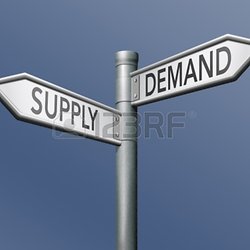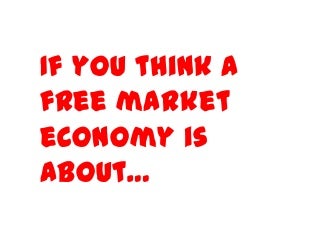 I have instructed that their stories tell the same fundamental story, with obvious differences in detail. In change for NME status, China was in a position to be part of the WTO, which meant its exporters otherwise had been granted the same therapy as that enjoyed by firms in more than a hundred and sixty member international locations. Source: Chad P. Bown Should the United States Recognize China as a Market Economic system?” Peterson Institute for International Economics Policy Transient, December 2016. In anticipation of 2016, the United States developed a separate policy underneath its countervailing responsibility (CVD) legislation, in case revocation of China’s NME status makes it too cumbersome to utilize anti-dumping. The process of the market makes mutually cooperative actions of the assorted members of society.
I have instructed that their stories tell the same fundamental story, with obvious differences in detail. In change for NME status, China was in a position to be part of the WTO, which meant its exporters otherwise had been granted the same therapy as that enjoyed by firms in more than a hundred and sixty member international locations. Source: Chad P. Bown Should the United States Recognize China as a Market Economic system?” Peterson Institute for International Economics Policy Transient, December 2016. In anticipation of 2016, the United States developed a separate policy underneath its countervailing responsibility (CVD) legislation, in case revocation of China’s NME status makes it too cumbersome to utilize anti-dumping. The process of the market makes mutually cooperative actions of the assorted members of society.
The Chinese government and the Communist Get together have made strategic adjustments but remain actively involved in banking, vitality and raw materials — and this permits them to implicitly subsidize other sectors of the economic system. As a result of NME status is prone to require a negotiated resolution between the United States and China, it is unlikely to be resolved anytime soon. Try the video beneath – courtesy of MetalMiner – for more in the marketplace economic system status concern.
China’s function in the world economic system will be the most divisive trade concern of the trendy era. But now the Asian superpower says it has earned the proper to trade as a market economic system, challenging the World Trade Organization and its protections in opposition to dumping. China was advised all that may change by the tip of 2016 when it will be upgraded to market economic system status. International trade consultants say China must start a lengthy legal battle at the WTO in opposition to its trade partners to be able to get recognition of its new status. When China joined the WTO in 2001, Section 15 of China’s Accession Protocol allowed members to treat China as a non-market economic system (NME) for a period of fifteen years to protect domestic producers from low-price Chinese imports.
A special provision was created that allowed WTO members to use anti-dumping tariffs – often known as non-market economic system (NME) methodologies – on Chinese goods being offered at unfair prices. While the United States and the European Union have had heated policy debates over China’s market economic system status, the same discussion has been fairly muted in Canada. The question of whether to grant China market economic system status is as much political as it is economic.
Prime Minister Justin Trudeau would possibly resolve that granting China market economic system status at the WTO is definitely worth the potential improvement in industrial relations. For Beijing, being recognized as a market economic system is a matter of national prestige as much as it is a boon to its struggling exporters. If Beijing is denied MES, it will largely probably pursue its own legal challenge for what it views as a violation of current WTO rules, regardless of any free trade negotiations between the two international locations. Canada just isn’t the only country weighing its options on whether to recognize China as a market economic system.

